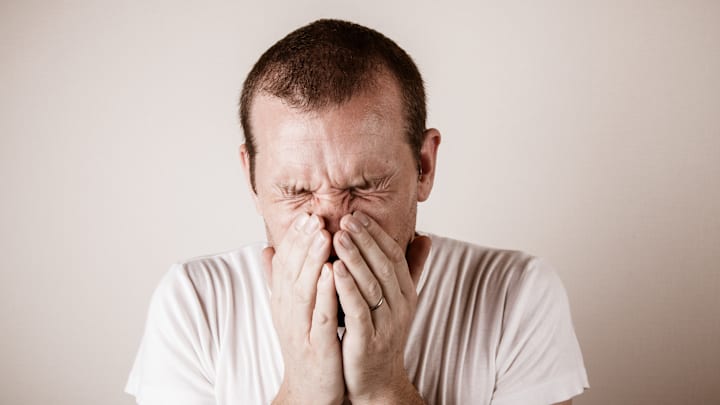Few things are more annoying than the build-up of an incoming sneeze—especially when it disappears at the last second without relief. Though it’s unpleasant, there are some occasions when you might try to quell a sneeze on purpose. Maybe you want to hold it in to prevent spreading germs or making noise, but be warned—doing so can cause injury.
In most cases, fighting to contain a sneeze will cause momentary discomfort. In the rare worst-case scenarios, you can damage blood vessels or rupture your eardrums. Vertigo—a physical sensation that makes you dizzy and unbalanced—may also occur. Other adverse consequences include diaphragm injury, throat damage, and ear infections. If you’re an older adult, you may be susceptible to fractured ribs.
How can a simple sneeze wreak so much havoc on your body? According to Heathline, the bodily function shoots mucus droplets from your nose and mouth at nearly 100 mph. Intense pressure in the respiratory system makes this possible. When you prevent a sneeze, the pressure is five to 24 times greater than it would be if you had let the sneeze happen.
The possible health effects may sound frightening, but the vast majority of suppressed sneezes don’t cause issues. Dr. Jason Abramowitz, an otolaryngologist with ENT and Allergy Associates, said in a blog post, “While the risks of severe injury are very low, it's often more comfortable and safer to let the sneeze out.”
When you’re body is telling you it has to sneeze, there’s usually a good reason. The action clears allergens, germs, and dust through sudden propulsions of air via the nose and mouth. A 2012 study [PDF] published in The FASEB Journal also showed that sneezing helps the nasal passage to reset, as the nose’s cilia lining is refreshed afterwards.
Instead of holding a sneeze in, use a tissue to cover your nose and mouth. If no tissues are around, shield your mouth and nose with your elbow. Sneezing into your hands is usually not recommended unless you can wash them immediately.
Read More About Health:
